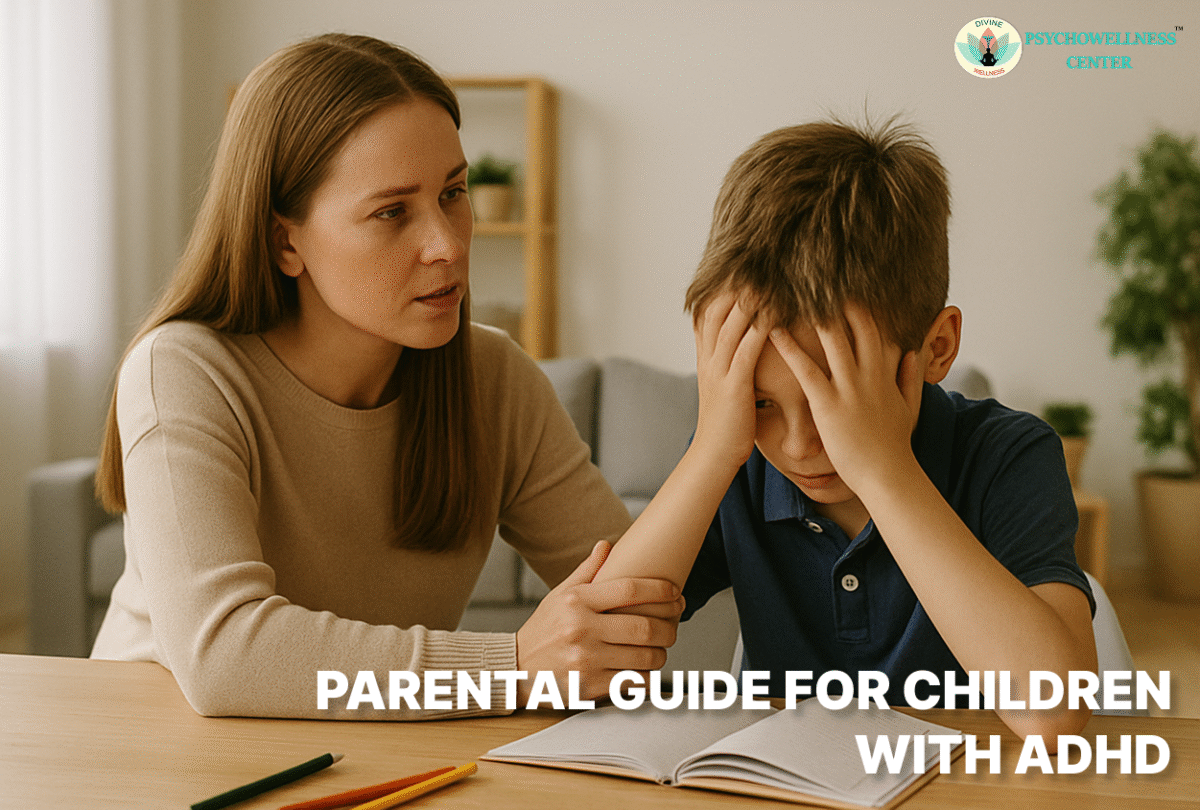Parenting a child with Attention-Deficit/Hyperactivity Disorder (ADHD) can often feel like navigating uncharted and unpredictable waters, where every day brings new challenges, emotional highs and lows, and unexpected behavioural patterns. These children may struggle with focus, impulsivity, and emotional regulation, yet they also possess incredible strengths such as creativity, spontaneity, empathy, and resilience. It’s important to understand that ADHD is not a reflection of poor parenting but a neurodevelopmental condition that requires informed care and consistent support. With the right mindset, practical strategies, and emotional connection, parents can help their children manage symptoms, build confidence, and reach their full potential. This guide is designed to help parents better understand ADHD, strengthen their bond with their child, and create a stable, nurturing environment that encourages emotional and behavioural growth.
Understanding ADHD: Beyond Just Hyperactivity
ADHD is a neurodevelopmental condition that affects focus, impulse control, emotional regulation, and energy levels. It’s important to remember that ADHD is not caused by poor parenting; it’s a medical condition with biological and neurological roots.
Common signs of ADHD include:
- Difficulty with focus or sustained attention
- Fidgeting, restlessness, or constant movement
- Acting without thinking or blurting out answers
- Trouble following multi-step instructions
Each child with ADHD is unique. Recognising how the condition manifests in your child is the first step toward effective, compassionate parenting.
Parenting with Patience and Structure
Children with ADHD often face work stress at school, peer rejection, or criticism from adults. Parents can be powerful allies in buffering these negative experiences through consistency, empathy, and proactive strategies.
- Build a Predictable Routine
Children with ADHD benefit from a structured daily schedule. Routines help reduce stress and anxiety, especially when visual charts or reminders are used.
- Break Tasks into Smaller Steps
Long tasks can feel overwhelming. Breaking homework or chores into smaller, manageable parts boosts attention and confidence. Use positive reinforcement to encourage progress.
- Clear and Concise Communication
To improve comprehension and reduce frustration, combine spoken instructions with visual hints.
Discipline Through Connection, Not Control
Traditional discipline often increases aggression or emotional burnout. Children with ADHD need connection and consistency more than punishment.
- Time-In Over Time-Outs: Instead of isolating your child, sit with them during emotional moments. Help them label feelings and find calm.
- Praise Efforts, Not Just Outcomes: Be specific (“You finished your homework, great job staying focused!”).
- Set Realistic Expectations: Every child makes mistakes. Guide them gently instead of criticising, which may damage their self-esteem.
Creating a Calm and Focused Home Environment
- Minimise Distractions
Designate quiet areas for study and relaxation. Reduce clutter, employ timers, and set screen time limitations to aid in time management.
- Encourage Physical Health
Regular movement reduces restlessness and enhances concentration. Dance, play, or sports can all help.
- Focus on Nutrition and Sleep
Proper sleep and nutrition support emotional and cognitive function. Incorporate protein-rich foods, complex carbs, and Omega-3s into your child’s diet.
Working with Schools and Mental Health Professionals
Teamwork is essential. Connect with teachers, counsellors, and support staff to ensure your child receives classroom accommodations like extra time or movement breaks.
For further support, consider consulting:
- A child psychologist or ADHD therapist
- A paediatrician or psychiatrist for behavioural evaluations.
- A parenting counsellor to strengthen your approach at home.
Effective interventions may include CBT, parent training, behavioural therapy, or medication when appropriate.
Helping Children Build Social and Emotional Skills
ADHD can make social situations challenging. Parents play a crucial role in building emotional resilience and improving interpersonal skills.
- Teach Social Skills: Practice conflict resolution, turn-taking, and listening through role-play.
- Validate Feelings: Respond to your child’s emotional expressions with empathy, not judgment.
- Model Self-Regulation: Demonstrate how to handle stress, anger, or disappointment constructively.
Taking Care of Yourself as a Parent
Parenting a child with ADHD is both rewarding and exhausting. To avoid burnout:
- Join support groups (online or offline)
- Take breaks to recharge
- Acknowledge small wins
- Give up striving for perfection; frequently, good enough is more than enough.
Making mental health a priority enables you to give your child your whole attention.
Conclusion: Love, Support, and the Right Guidance
Raising a child with ADHD is a journey that requires patience, compassion, and adaptability. With consistency, structure, and emotional support, children with ADHD can grow into confident, capable, and emotionally intelligent individuals.
If your child struggles with stress, anxiety, aggression, isolation, or difficulty with time management, don’t hesitate to seek professional help. Centres like Psychowellness Center in Janakpuri and Dwarka Sector-17, Delhi, offer expert services in parenting counselling, ADHD support, emotional regulation, and more. Their team includes experienced child psychologists and ADHD therapists who understand the unique needs of children and families.
Prefer privacy or flexibility? TalktoAngel offers secure online counselling sessions, making access to mental health support easier than ever, especially for working parents dealing with work stress or caregiving responsibilities. Whether you’re searching for the best child psychologist near me or need immediate counselling help, the first step is reaching out.
Empower yourself and your child today. Call 011-47039812 or 7827208707 to begin your journey toward calm, connection, and lasting change.
Dr. R. K. Suri and Ms. Drishti Rajore bring their expertise as a clinical psychologist and counseling psychologist, respectively, to their contributions. Individuals can schedule sessions for tailored psychological support.
This blog was posted on 7 August 2025
References
Barkley, R. A. (2013). Taking charge of ADHD: The complete, authoritative guide for parents (3rd ed.). The Guilford Press.
Chronis-Tuscano, A., Wang, C. H., Woods, K. E., Strickland, J., & Stein, M. A. (2017). Parent training for preschool ADHD: A review of evidence and mechanisms. Journal of Child Psychology and Psychiatry, 58(9), 928–935. https://doi.org/10.1111/jcpp.12738
Hinshaw, S. P., & Ellison, K. (2016). ADHD: What everyone needs to know. Oxford University Press.
https://www.psychowellnesscenter.com/service-adhd-occupational-therapy-in-delhi/
https://www.psychowellnesscenter.com/Blog/how-to-use-behavioural-therapies-for-adhd/

